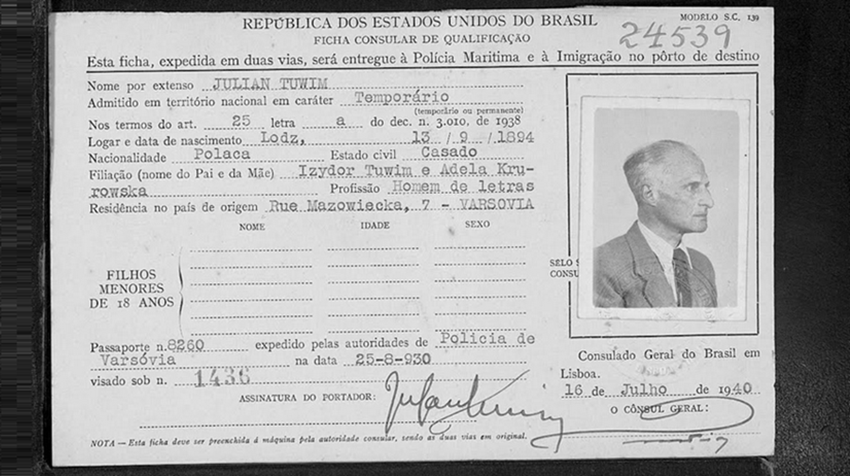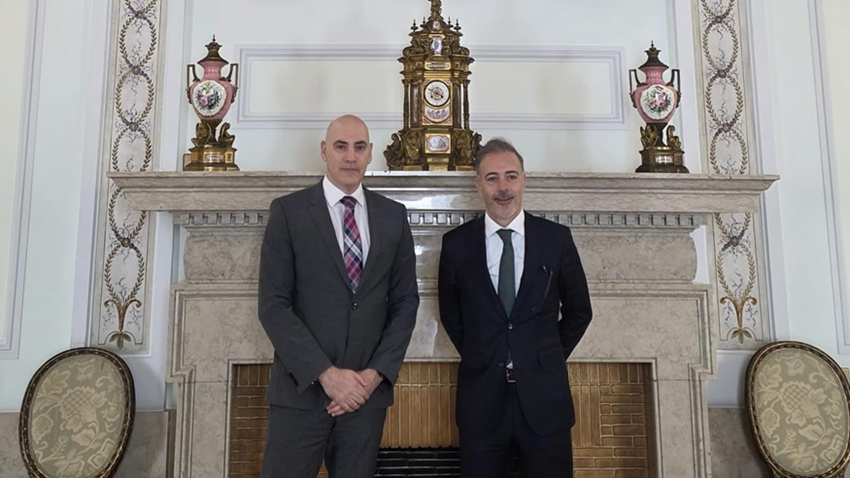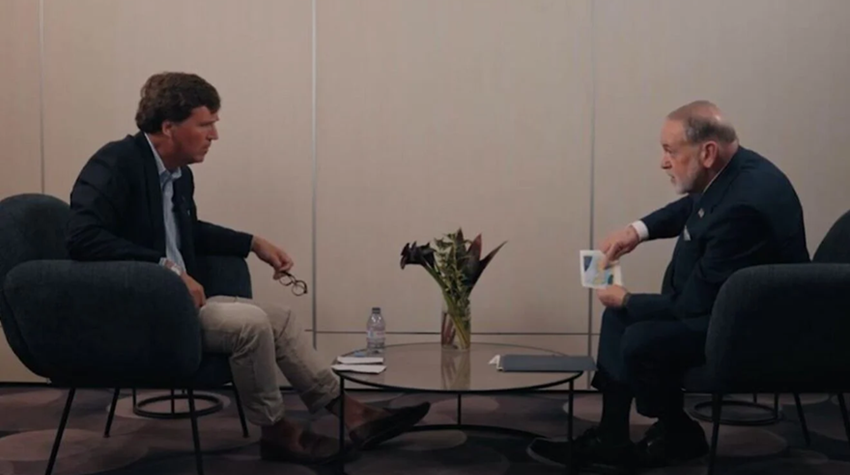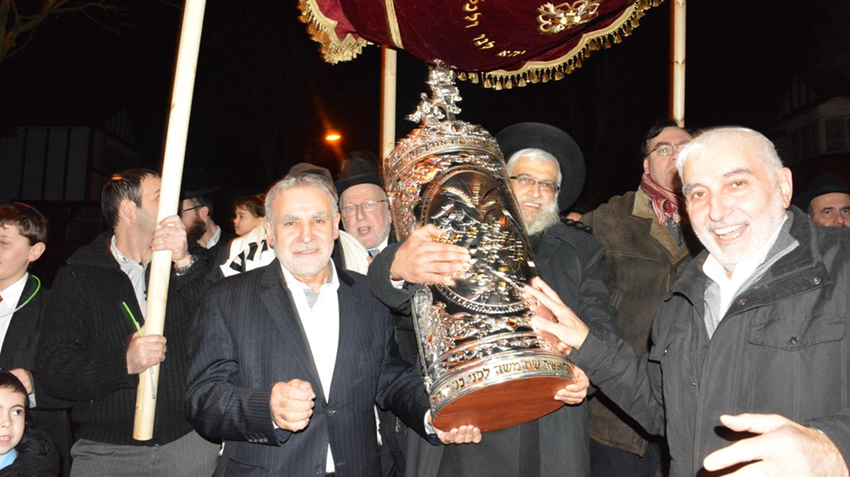"Brasil, Cartões de Imigração, 1900-1980", FamilySearch, Entry for Julian Tuwim, 1940.
The Holocaust Museum of Oporto has recently uncovered the fate of six Jewish refugees who passed through the city during World War II. By cross-referencing refugee registration records from Portugal with immigration lists from the Holocaust Museum in Curitiba, it was possible to identify two Polish families who reached Brazil with Portuguese visas.
These refugee records, which are part of the Holocaust Museum of Oporto’s permanent exhibition, belong to the Dolinger and Tuwim families. Both received visas issued by the Portuguese Consul General in Bordeaux, Aristides de Sousa Mendes, who was later recognized as “Righteous Among the Nations”.
The Tuwim Couple
The Tuwim family consisted of Julian Tuwim (1894) and Stefania (1897), both born in Łódź and residents of Warsaw. Julian was a philosopher, lawyer, and a prominent figure in Polish literature, particularly known for his contributions to poetry and children’s literature.

The refugee registration cards of Julian and Stefania Tuwim are part of the collection of the Holocaust Museum of Oporto. Credit: Holocaust Museum of Oporto
The couple fled through Romania and France and, in 1940, received Portuguese visas. After spending several months in Portugal, they sailed to Brazil aboard the Angola with temporary Brazilian visas.
Brazil, however, was not their final destination. In 1942, the Tuwims moved to the United States, where they remained until the end of the war. In 1946, they returned to Poland and adopted Ewa, a Jewish girl who had lost her parents and was living in an orphanage.

"Brasil, Cartões de Imigração, 1900-1980", FamilySearch, Entry for Stefania Tuwim, 1940.
Julian Tuwim is seen as a powerful symbol of dual Polish and Jewish identity. His manifesto "We, Polish Jews", dedicated to the memory of his mother who was murdered by the Nazis, expresses his profound connection to both heritages.
"I am a Pole because I want to be. That is my personal, deeply private affair, and no one has the right to interfere. I am a Jew because that’s what I was born. That is not a matter of choice." (Julian Tuwim, 1944)
Julian died in 1953 and Stefania in 1991.
The Dolinger Family
The Dolinger family was composed of Hersch Dolinger (1901), Rosa (née Ganzarski, 1914), and their children Jackie (Jacob, 1935) and Max (1936). Originally from Poland, they lived in Antwerp, Belgium, where their children were born. Hersch worked in the diamond trade.

The refugee registration cards of Hersch and Rosa Dolinger are part of the collection of the Holocaust Museum of Oporto. Credit: Holocaust Museum of Oporto
With transit visas granted by Aristides de Sousa Mendes, they arrived in Portugal in 1940 and spent time in Curia and Oporto. In February 1941, they boarded the Serpa Pinto bound for Brazil, with permanent visas issued by the Brazilian Consulate General in Lisbon.

The refugee registration cards of Jackie (Jacob) and Max Dolinger are part of the collection of the Holocaust Museum of Oporto. Credit: Holocaust Museum of Oporto
In Brazil, Hersch and Rosa had two more sons, Shaul and Israel, named after Hersch’s father and brother. Records from Yad Vashem show that among the Dolingers from Antwerp, only one of Hersch’s sisters survived the war, highlighting the crucial decision the couple made in choosing to emigrate.

"Brasil, Cartões de Imigração, 1900-1980", FamilySearch, Entry for Hersch and Rosa Dolinger, 1941.
Max Dolinger, who was four years old when he passed through Portugal, became a major benefactor of the Jewish community in Rio de Janeiro. He served as president of the Chevra Kadisha and led a Jewish school for decades. He passed away in 2015, but his legacy lives on through the philanthropic work of his widow, Rivka Dolinger, and through the continuation of Jewish life among his children and grandchildren.

FamilySearch, "Consular qualification form" for Max Dolinger, 1956.
Jacob Dolinger, the eldest son, became a renowned jurist and expert in international law. He taught at universities in Brazil, the United States, and Israel. He spent his final years in Israel, where he passed away in 2019.
Jacob Dolinger, who was five years old when he arrived in Portugal as a refugee, went on to become a highly respected jurist.
About the Holocaust Museum of Oporto
Opened in 2021, the Holocaust Museum of Oporto is the first of its kind in Portugal. Its collection includes approximately 400 records of Jewish refugees who stayed temporarily in Portugal between 1940 and 1941, en route to South, Central, and North America.
The museum stands out for its strong educational mission, promoting Holocaust education in Portuguese schools, training educators, and supporting historical exhibitions and research. It is overseen by the Jewish Community of Oporto, and its continued operation depends on the support of benefactors.

The records of the Jewish refugees are on display at the Holocaust Museum of Oporto. Credit: The Holocaust Museum of Oporto
The discovery of the fates of the Dolinger and Tuwim families and the legacies they built underscores Portugal’s critical role as an escape route during the Holocaust and highlights the importance of international collaboration between institutions in preserving memory and stories of survival.



































